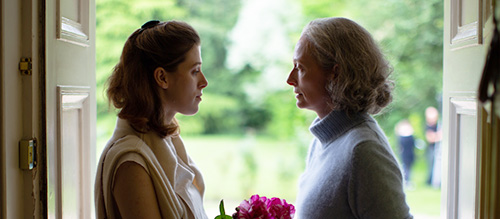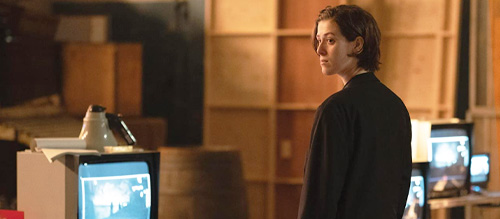The Souvenir: Part II (2021) Review
The Souvenir: Part II (2021)
Director: Joanna Hogg
Screenwriter: Joanna Hogg
Starring: Honor Swinton Byrne, Tilda Swinton, Charlie Heaton, Jaygann Ayeh, Richard Ayoade
In 2019, highly influential British director Joanna Hogg deconstructed the genesis of her own filmmaking career and tackled real-life tragedy in the magnetic and subtly roaring autobiography The Souvenir; a film with the power to break a heart with a single fourth-wall breaking glance and the bravery to alter its perspective as it progressed. It was one of 2019’s most personal and profound releases, and with The Souvenir: Part II she has done it again, achieving the impossible in taking a near-perfect artistic achievement and managing to evolve it, twist it and turn it into a self-reflective masterstroke of finding one’s self in the midst of life-altering grief.
As in The Souvenir, Part II follows Honor Swinton Byrne’s Julie as she attends film school and puts together a personal film project – this time illustrating the difficulties found in tapping into personal tragedy and experience while in the pursuit of art. Here we see Julie struggle to separate the artistic needs of her production from how she remembers her actual experiences, we see her succumb to criticisms regarding the lack of direction she seems to have whilst in charge of the project, and one can’t help but to relate said struggles to Hogg’s own career, not least her debut short film Caprice and perhaps even The Souvenir. Most importantly to The Souvenir: Part II‘s narrative, we see Julie grow to understand the enigmatic persona of her former lover Anthony (Tom Burke) through her artistic endeavour, ultimately finding peace with his at-first-glance selfish decisions.
Swinton Byrne’s turn at the head of Part II is an anchor upon which the whole production relies, the on-and-off screen daughter of acting juggernaut Tilda Swinton being nothing short of masterful in her transitions between ordinary dialogue exchanges and her character being overtaken with grief, Swinton Byrne’s eyes telling the whole story as Julie checks out of her immediate environment to remember, to feel, to experience loss. Former partner Anthony is a shadow that hangs over the entire film and thus each of Julie’s experiences, and Swinton Byrne’s phenomenal abilities to convey a sadness more deeply rooted than the first film’s melancholia is one of the most unmissable aspects of this picture.
This sadness is one that is imbued within every creative decision of The Souvenir: Part II from the very start. The original’s title cards, which read poetically and acted as transitions between verses in Hogg’s self-reflective poem, are less present here and completely absent of words – gone is the poetry of Julie’s life, as gone is her most monumental presence. Early on we see Julie orgasm, though the elation and joy of the experience is exchanged for the mundanity of passing cars, the sounds of their engines overwhelming the scene to illustrate Julie’s disconnect with her partner, her environment and even with herself. In one memorable scene with ‘Stranger Things’ actor Charlie Heaton, Julie’s much-too-short meaningless sexual encounter ends with her temporary lover lifting his head toward the camera, face bloodied from Julie’s period, almost as if a vampire sucking what’s left of her life from her. It’s a stance taken very early on that confronts the role of men in the lives of women, and particularly within the life of Hogg herself.
There is a sourness to every exchange with the men that Swinton Byrne’s Julie goes through. Whether they be an incompetent lover or a filmmaking colleague, Julie is tasked with fighting battles she need not fight, particularly whilst processing the grief she is encountering (again, because of a man). Even her best friend – Jaygann Ayeh’s Marland – who is presented throughout both movies as being among the best of all men (understanding, empathetic, supportive) is in one scene shown raising his voice, trading insults and bringing a wholly masculine presence into Julie’s life, albeit one that is in support of her. Almost unknowingly, he too is reinforcing feelings of belittlement and the gendered oppression that Julie is feeling. At home, Julie’s father William (James Spencer Ashworth), who is painted as being similarly as understanding and supportive, is relatively dismissive of what means the most to both his daughter (her film) and his wife (her new pottery class). As Julie attempts to make her film, her mother Rosalind (Tilda Swinton) attempts to complete her first pottery project – a small clay vase that Julie accidentally smashes into pieces. The destruction of the vase leaves both Rosalind and Julie on the verge of tears as Julie in particular understands the monumental importance the vase holds in her mother’s search for independence and artistic absolution. William simply dismisses the accident, noting the vase as “silly” just as he passively belittled Julie’s film but a few scenes earlier.

It is through this wider exploration of the role of men in Julie’s life that The Souvenir: Part II evolves, altering its perspective just as its predecessor did, masterfully taking a story of grief and moulding it into a love letter between daughter and mother. Tilda Swinton, who starred in director Joanna Hogg’s first short film in 1986, is toned down from some of her more mainstream roles but all the more remarkable for it. In taking up more of a presence in Part II, her character develops not only within herself but within the wider context of Julie’s life, and given the autobiographical elements of Hogg’s self-reflection, her every scene of empathy, love and support hits like bullet. Here she feels more well-rounded, more integral, and through the power of her performance and how central she is to the narrative, Swinton’s Rosalind demands empathy and understanding, forcing one of the film’s most powerful moments when she arrives at Julie’s short film premiere dressed to the nines, withdrawn in body language but eyes wide in anticipation for the fruit of her daughter’s labours.
It seems that per the grief and trauma of the events seen in The Souvenir, Rosalind is the only person who can possibly relate to Julie, who can possibly understand her. In a world of men being loud, brash and at times outlandishly (and comically) arrogant – namely Richard Ayoade as Patrick – Rosalind is the angel to whom Julie looks for advice, for comfort; the woman she confides in and expresses herself to.
While every element of the filmmaking process works in service of the guttural self-reflection intended by the filmmaker, with some of the film’s most beautiful shots being almost entirely still images of people sitting in tremendously lit locations, The Souvenir: Part II is not short of the artistic flair and authorial strokes of its predecessor. Just as the fourth wall break of the original film bravely brought the story and therefore the emotional responsibility of the project back to the filmmaker, The Souvenir: Part II features its own moments of contextualisation through artistic flair, a standout of which is a montage that functions similarly to that of An American in Paris‘ last act and may hit just as hard. For fans of the first film, there is a final act here that will hit time and time again, leaving the most emotionally open of filmgoers in floods of tears.
So rarely is any sequel such a perfect evolution of an original film, yet in searching so deeply within herself Joanna Hogg has achieved something just as unforgettable, with moments just as transcendent. This isn’t just monumental cinema, it’s cinema history and its future all at once; a woman owning her life and taking ownership of her art form. It’s cinema so rich, so prodigious, that it asks: what need is there to ever watch anything else again?
24/24


